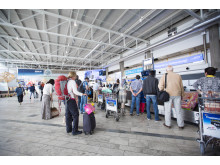IATA has warned a proposed Swedish aviation tax would be “disastrous” for the country’s economy and result in 7,500 job losses.
Aviation delivers major economic benefits to Sweden, generating 4.2% of GDP and supporting 240,000 jobs.
IATA has urged the people of Sweden and businesses to persuade the government to reject the “green tax” proposals after analysis showed Swedish GDP would be SEK5 billion (US $553 million) lower as a result of the legislation.
This would mean around one million fewer passengers and 7,500 fewer jobs in the aviation industry and wider economy.
IATA has also emphasized the government inquiry committee’s recognition that the climate change impact of the tax would be negligible.
Rafael Schvartzman, IATA’s Regional Vice President for Europe, said: “This tax will be disastrous for the Swedish economy.
“Those promoting the tax are essentially suggesting that 7,500 Swedish workers are worth sacrificing to save 48 hours’ worth of carbon emissions on Sweden’s roads.
“We urge Swedish businesses and the Swedish people to persuade the government to reject this tax and are eager to support them in this important task.
“Sweden should be working with European and world partners to make a success of existing aviation climate policies, not imposing ineffective measures that cripple the economy while having almost no impact on the environment.”
Schvartzman also stressed the commitment of IATA—and the aviation industry as a whole—to reduce carbon emissions. Aviation was the first global business sector to set tough carbon targets, including carbon-neutral growth from 2020 and cutting 2005 emissions in half by 2050.
Last year ICAO member states, including Sweden, recognized that CORSIA (Carbon Offset and Reduction Scheme for International Aviation) should be the market-based measure for international aviation.
“The implementation of national or regional taxes on top of CORSIA is not only redundant, it also goes against the ICAO agreement and risks alienating States from implementing CORSIA,” added Schvartzman.


























